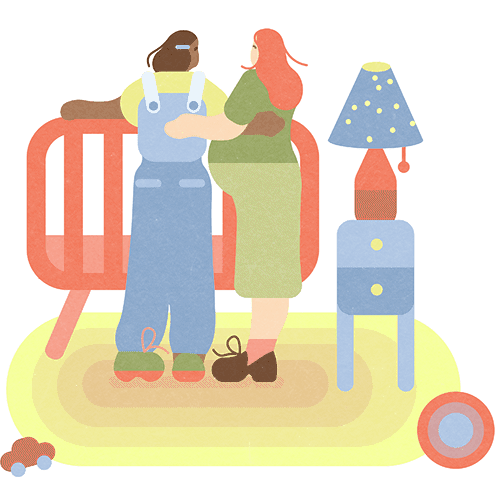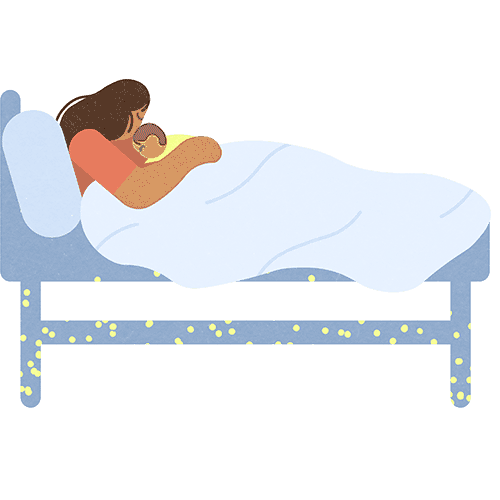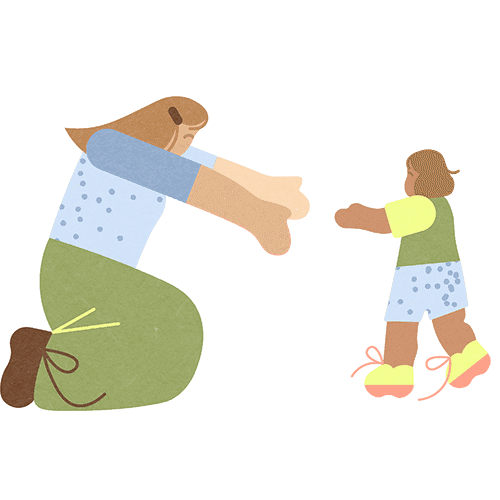- Services
- Occupational Therapy Newmarket
Occupational Therapy in Newmarket
What, exactly, is Occupational Therapy?
Let’s start by defining the term ‘occupation’. With regard to Occupational Therapy, think of occupations as the activities and tasks you employ in everyday life. Essentially, it’s anything that occupies your time. This can include taking care of yourself, things you do in your down time (leisure activities), and your social and economic contributions to your communities.
For adults, these activities encompass a wide range, from work (both paid and unpaid), education, caregiving, and self-care, to leisure pursuits, sleeping, driving, and more. For infants, it pertains to activities such as growth, movement, feeding, and sleep.
Occupational Therapists can assist with the transition to parenthood. They help parents develop strategies and routines to cope with the changes and challenges in their daily life, whether they are trying to conceive, are currently pregnant or already have a family. Pediatric Occupational therapists are there to support your children with achieving their milestones and other developmental goals.
Select your journey to learn more

Fertility
Discover routines and systems to help during conception

Prenatal
Support to help with the transition into a new role

Postpartum
Get tips and support on how to cope as a new parent

Pediatric
Essential diagnostics and assessments for your little one
Occupational Therapy for Fertility in Toronto & Newmarket
Occupational Therapy for those dealing with fertility issues can help provide structure, routine, and calm in the face of the unknown
During the journey towards parenthood, occupational therapy can provide valuable support. Trying to conceive can feel like a demanding endeavour, almost like working a second full-time job.
Our occupational therapists collaborate with you to determine the specific challenges you face in your daily routines and then work with you to come up with solutions to ease those burdens.
Occupational therapy is here to make day-to-day life easier for you.
Prenatal Occupational Therapy in Toronto & Newmarket
Occupational Therapy can help ease the stresses of pregnancy
Pregnancy is marked by a lot of life transitions, not limited to the daily changes you see in your body. It goes beyond the physical.
Occupational therapists specialize in aiding individuals during the transition to parenthood. This encompasses helping expectant parents establish effective systems and routines that adapt to the unique demands of pregnancy.
Furthermore, an Occupational Therapist is someone who can help you establish and define personal boundaries as your identity and role in life evolve.
Let one of Oona’s Occupational Therapists provide you with the resources to confidently transition into parenthood.
Postpartum Occupational Therapy in Toronto and Newmarket
Transitioning into motherhood with Occupational Therapy
Becoming a mother is a significant life event, and its impact extends beyond the physical realm. Occupational therapists are equipped to guide women through this transition by addressing multifaceted challenges. They assist in creating healthy roles and routines, fostering a strong connection with the newborn, and devising coping mechanisms for a smoother transition into motherhood.
The shift from pregnancy to motherhood is profound, and unique to each individual. During this time of significant transition, the occupations you face as a newly postpartum person (all of the things that occupy your time) are deeply affected. We’ve come a long way with regard to support for conception, pregnancy, and childbirth, but still we find the non-medical aspects of becoming a parent remain in the shadows.
Just ask anyone who has been pregnant or has a child, and they will tell you that there is so much more to conception, supporting a healthy pregnancy, labour and delivery, and becoming a mother than the physical.
Our occupational therapists are armed with a unique toolkit that makes them particularly adept at assisting and partnering with women throughout their pregnancy, childbirth, and early motherhood experiences. These professionals are well-equipped to tackle the unique hurdles that women encounter as they navigate the path to motherhood.
These challenges encompass intricate aspects such as establishing fresh, positive roles and routines, nurturing a strong bond with their newborns, and devising coping mechanisms to facilitate this transitional phase.
How Can an Occupational Therapist Support Me?
The arrival of a new family member is a remarkable experience, yet it often brings along its own distinct set of hurdles. Every baby is unique, and as parents gradually become acquainted with their baby, numerous questions and concerns may arise.
Occupational therapy shines a light on the common challenges that pregnancy and parenting can bring. Our occupational therapists collaborate with women to develop realistic expectations and come up with effective coping strategies focusing on shared activities between the mother/parent and the infant to strengthen the bond, boost confidence in promoting wholesome growth, participate in enjoyable and age-appropriate play, and promptly detect unusual scenarios for timely and effective intervention.
Oona’s Occupational Therapists can help with:
- Relaxation strategies
- Managing anxiety and depression
- Enhancing sleep and increase energy levels
- Troubleshooting and planning effective coping strategies for potential obstacles before they arise
Pediatric Occupational Therapy in Newmarket & Toronto
We tend to use the term “occupation” to mean “job”, so the term “Occupational Therapist”can be confusing when it comes to kids. We get it.
The arrival of a new baby in the family is a wonderful experience, but it can come with its own distinct challenges.
Pediatric occupational therapists can assess babies and children for the following:
- Delayed Gross Motor Skills (e.g. not reaching milestones like crawling, sitting, walking, rolling on time )
- Delayed Fine Motor Skills (e.g. struggles with tasks like grasping toys, cutlery, scissors, etc)
- Abnormal muscle tone (e.g. low muscle tone leading to floppiness or poor muscle control, or excessive muscle tone causing tightness)
- Feeding challenges (e.g. heightened sensitivity to specific textures, extreme food pickiness, difficulty transitioning to solid food)
- Sensory-related issues (e.g. heightened or diminished sensitivity to sounds, textures, tastes, or seeking sensory input)
Pediatric occupational therapy can also provide support in these areas:
- Developing tactics to overcome difficulties when transitioning to solid foods
- Offering strategies and therapeutic interventions for infants with sensory sensitivities
- Assessments related to autism
- Designing exercises and interactive play for infants encountering delays in motor development
- Crafting strategies to reduce plagiocephaly or flat head syndrome
- Recommending stretches and exercises to address torticollis (wry neck)
- …and so much more!
Paediatric Occupational Therapy Packages
Starting Solids Consultation
This appointment is for caregivers who are looking for individualized guidance and support in the initial months of introducing solid foods to your baby.
Feeding Success
Picky Eater Assessment
School Readiness Assessment
Infant & Early Development Check
Sensory and Self-Regulation Assessment
Fine Motor Assessment
Baby Steps Classes
Have you ever wondered if your baby is reaching their developmental milestones on track? Should they be crawling or rolling over already? Is their eating, sleeping, and play helping their overall brain and body development?
Oona presents ‘Baby Steps’ – this class is for moms and babies, guided by our occupational therapists, and may be eligible for insurance coverage. These intimate group sessions provide a great chance to connect with other parents in your community, and support one another (did we mention it may be covered by insurance!?)
Baby Steps Level 1 is for ages 6 weeks – 6 months
Baby Steps Level 2 is for ages 6 months – 1 year old
Common Questions About Pediatric Occupational Therapy
Your baby may benefit from an occupational therapy assessment if you and/or your baby’s pediatrician has concerns about developmental delays in the area of motor skills, feeding or cognitive skills.
The assessment will provide an understanding of your baby’s strengths and challenges. Treatment will focus on strategies to teach and progress your baby in learning a new skill.
You do not need a referral to see an occupational therapist. If you have concerns about your baby’s development, feel free to contact the therapist to discuss the possibility of an assessment.
Please check with your insurance provider to see if you have coverage.
At Oona, we focus on pediatric occupational therapy for newborns to toddlers (age 0 to 2 years).
What’s the difference between infant physical therapy and infant occupational therapy?
In the most simple terms, Physical Therapists (PT) specialize in gross motor issues and development. While Occupational Therapists (OT) focuses on the issues and development for occupation, which for babies is mainly play, sleeping and eating. There are many areas that affect occupation, such as gross motor, fine motor, sensory, and cognitive skills.
There is a lot of overlap between OTs and PTs because gross motor and movement is a big component of development for babies. For example, a 5-month-old won’t be able to engage in play if they are not strong enough to roll (gross motor), but the baby’s play can also be affected by their cognitive abilities, sensory abilities, and fine motor skills.
An OT will work on all areas of development towards the goal of increased play, but a PT will likely focus on a goal like increase strength for rolling. OTs are also a better fit if there are issues around feeding (ie. chewing, swallowing or sensory-related).
During the first visit, your occupational therapist will review your baby’s medical history and discuss your concerns. An assessment of your baby’s skills will be completed by a combination of formal testing and observations through play. At the end of the session the therapist will provide an analysis and recommend treatment options. Treatment is always in collaboration with the family and can include returning for therapy or a home program.
Follow-up sessions can vary depending on your baby’s treatment plan.. Babies who are returning for therapy will work one-on-one with the therapist to develop skills; parents can observe and practice these hands-on techniques. Some babies will be re-assessed and introduced to new activities for a home program. Everything is tailored to meet the family’s and baby’s needs.
Progress depends on your baby’s delays, diagnosis and treatment. Usually we start seeing some improvement within 3 to 4 weeks of starting a treatment plan.
Pediatric occupational therapy focuses on occupation as the goal therapy for a baby. Treatment for an older child will differ because occupational and developmental stages are quite different. An OT goal for a baby may be to work on fine motor skills so the baby can reach and play with a toy above his/her head. While an OT goal for a child in school would be to increase fine motor skills so that the child can hold his/her pencil to write their name.
We can provide an itemized occupational therapy receipt at the end of the one-on-one occupational therapy session or the Baby Steps workshop series for you to submit to your extended health insurance plan. Please note that every health insurance is different and you can check to see if you have coverage.
OT can help with a wide range of challenges, from helping babies with feeding difficulties to supporting older children with developmental delays or sensory processing differences. We focus on making daily life easier and more enjoyable for your whole family.
Common Questions About Virtual Occupational Therapy
Paediatric OT services are available to you safely and virtually! If you have concerns about whether your baby is reaching their developmental milestones or if you are having difficulties helping your child transition to solids we can help via online sessions.
You do not need a referral to see an occupational therapist. If you have concerns about your baby’s development and believe an occupational therapist can address them, feel free to contact us or book an assessment online.
Services may be covered under your health plan – please check with your insurance company for details.
After you schedule your appointment, the occupational therapist will contact you to discuss your concerns and help you prepare for the scheduled appointment. In most cases, the therapist will have you prepare a play area or feeding area for your baby where the camera will be set up for observations.
After a detailed conversation with the therapist, you will be taken through step by step instructions on how to set up activities for your baby so the therapist can observe their skills during structured play activities. The observations, along with your knowledge of your baby’s behaviour, will provide a lot of information regarding his/her development.
In follow-up sessions, you can expect the therapist to contact you ahead of time to inform you of the activities that will be completed and what you need to prepare for those activities. During the session the therapist will guide you through a series of activities for therapeutic skill building. All activities will be tailored to your baby’s needs and goals.
Likely not! The best tool to stimulate your baby’s or child’s development is usually their parent’s love and interaction, so you are the most important thing to the sessions. If we need other toys or equipment we can likely use what you already have.
OT can help with a wide range of challenges, from helping babies with feeding difficulties to supporting older children with developmental delays or sensory processing differences. We focus on making daily life easier and more enjoyable for your whole family.
Common Questions About Occupational Therapy
If you are having challenges in any area of your life or find you are unable to fulfill any of your life roles to your satisfaction you may benefit from an occupational therapy assessment.
The assessment will provide an understanding of your strengths and challenges. The Occupational Therapist will also use a combination of standardized assessments, observation, and listening to understand how your life has been impacted. Collaboration will take place to develop a personalized treatment plan that uses strengths to address your needs and increase your performance and satisfaction in your life roles.
You do not need a referral to see an occupational therapist. If you have questions about how an Occupational Therapist can help you, feel free to contact the therapist to discuss the possibility of an assessment.
Please check with your insurance provider to see if you have coverage.
Yes! Our pediatric OTs support children in developing skills for everyday life—things like motor coordination, feeding, sensory regulation, and play development. We see kids from infancy through school age.
In the most simple terms, Physical Therapists (PT) specialize in gross motor issues and development. While Occupational Therapists (OT) focuses on the issues and development for occupation, which for babies is mainly play, sleeping and eating. There are many areas that affect occupation, such as gross motor, fine motor, sensory, and cognitive skills.
There is a lot of overlap between OTs and PTs because gross motor and movement is a big component of development for babies. For example, a 5-month-old won’t be able to engage in play if they are not strong enough to roll (gross motor), but the baby’s play can also be affected by their cognitive abilities, sensory abilities, and fine motor skills.
An OT will work on all areas of development towards the goal of increased play, but a PT will likely focus on a goal like increased strength for rolling. OTs are also a better fit if there are issues around feeding (ie. chewing, swallowing or sensory-related).
During the first visit, your occupational therapist will review your medical history and discuss your concerns. An assessment will be completed by a combination of listening, understanding your story, and how your life has been impacted. This assessment will vary based on need. At the end of the session the therapist will provide an analysis and recommend treatment options. Treatment is always in collaboration with you.
Follow-up sessions can vary depending on your treatment plan. This can include reviewing recommended treatments, treatment goals, and discussing progress. Some clients might be re-assessed and introduced to new approaches depending on needs and progress.
Progress depends on delays, diagnosis and treatment. Usually, we start seeing some improvement within 3 to 4 weeks of starting a treatment plan.
We can provide an itemized occupational therapy receipt at the end of the one-on-one occupational therapy session for you to submit to your extended health insurance plan. Please note that every health insurance is different and you can check to see if you have coverage.
Cancellation and Late Policies
Direct insurance billing
Oona works with insurance companies to do online billing for treatments, whenever possible. Simply ask if your insurance company is compliant when you book your appointment.